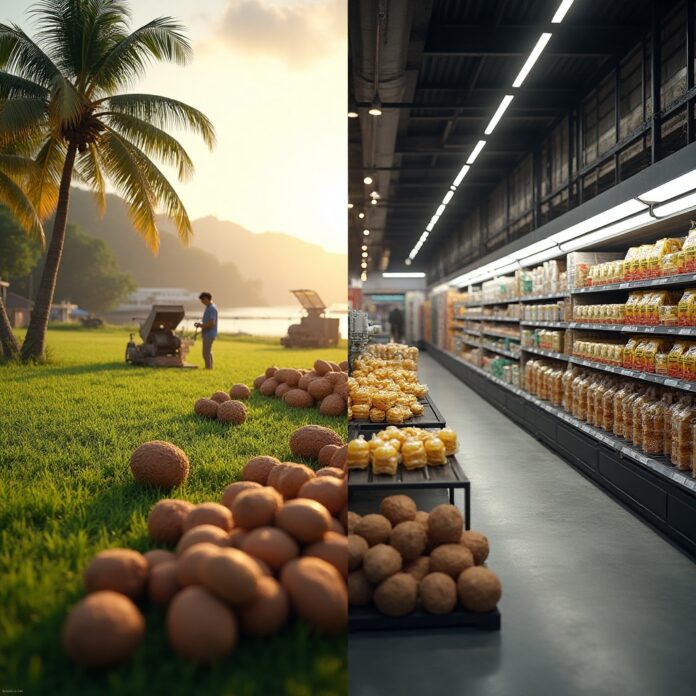Let’s talk coconuts. Not the ones you sip lazily on a beach, but the ones fueling a $20+ billion global industry. Coconut oil and chips aren’t just pantry staples anymore—they’re goldmines for food and beverage producers. Why? Health-conscious consumers are ditching seed oils for virgin coconut oil, and snackers are trading potato chips for crispy, guilt-free coconut flakes. But here’s the catch: Scaling production isn’t as breezy as a tropical vacation. Between sourcing quality raw materials, juggling equipment costs, and dodging export landmines, the path to profitability is riddled with husks (pun intended). Let’s cut through the noise.
🏗️ BuildNaija Expo 2025!
🗓️ May 30-31 | Online Event via Google Meet
Sourcing Raw Materials: Quality, Cost, and Sustainability
First rule of coconut business: Your product is only as good as your raw materials.
- Where to Source: The Philippines, India, and Indonesia produce 70% of the world’s coconuts (FAO 2023). Mature coconuts (12+ months old) yield richer oil, while younger ones (6-8 months) are sweeter for chips. Partner with cooperatives—they’re your ethical shortcut to traceability.
- Cost Realities: Prices swing wildly. In 2023, a ton of mature coconuts cost 300−300−500 (USDA), but El Niño-driven droughts spiked rates by 20% in key regions. Lock in contracts during harvest seasons (July-September in Southeast Asia).
- Sustainability Non-Negotiables: Buyers demand Fair Trade or Organic certifications. One pro tip: Use husks for biochar or coir mats. Waste isn’t just unethical—it’s leaving money on the table.
Equipment and Production Costs: Scaling Efficiently
Let’s get real about machinery—because this is where most startups trip. You’re not just buying tools; you’re buying time.
🏗️ BuildNaija Expo 2025!
🗓️ May 30-31 | Online Event via Google Meet
- Coconut Oil Gear: Cold-pressed oil demands hydraulic presses (15k–15k–30k for small-scale). Expeller machines? Cheaper (8k–8k–20k) but trade purity for speed. Industrial setups? Brace yourself: $100k+ for automated lines (Philippine Coconut Authority).
- Coconut Chips Kit: Semi-automated lines (slicing, drying, flavor coating) run 25k–25k–50k. Full automation doubles the price but halves labor—critical in regions like India, where wages rose 12% last year (World Bank).
- The Hidden Tax: Maintenance. A 10koilpressguzzlesanother10koilpressguzzlesanother2k/year in parts. Skip stainless steel? Enjoy FDA rejection letters. Solar-drying cuts energy costs by 40% in sun-drenched regions like Indonesia.
- Funding Hacks: Thailand offers 15% rebates for eco-friendly setups (ASEAN Agri-Development Fund).
Navigating Export Challenges
Exporting coconut products isn’t for the faint-hearted. One misstep, and your container’s rotting in a port.
- Certification Jungle: The EU requires organic certs (5k–5k–10k); the Middle East demands Halal stamps. Coconut chips need allergen labels—cross-contamination with peanuts? Game over.
- Shelf-Life Wars: Nitrogen-flushed packaging adds 0.20 per bag but extends shelf life from 6 to12months. Refrigerated shipping? 4k per container vs. $2k for ambient (ITC Trade Map).
- Tariff Traps: The U.S. slaps 8% on coconut oil; Europe’s kinder at 4%. ASEAN nations offer zero tariffs under trade pacts.
- Cultural Nuances: Americans want “lightly salted” chips. Japanese buyers crave wasabi-infused.
Case Studies: Success Stories and Lessons Learned
- Philippines’ Oil Triumph: CocoPure cracked Europe with solar-drying and Fair Trade certs. Their $50k loss on a failed EU pesticide shipment? Now they test every batch.
- India’s Chip Hustle: TropiCrunch used AI to optimize slicing thickness (0.3mm = perfect crunch). A broken $10k dryer mid-monsoon? Farmers crowdfunded a backup via WhatsApp.
Future Trends and Opportunities
- AI & Robots: Vision systems cut waste by 17% in Filipino factories ($5k/month software).
- Africa’s Rise: Nigeria’s coconut acreage grew 40% since 2020. Land costs 100/hectarevs.100/hectarevs.3k in Indonesia.
- Beyond Snacks: Coconut pulp protein (65% content) rivals whey. Patents pending (NutraKernel trials).
Three pillars:
🏗️ BuildNaija Expo 2025!
🗓️ May 30-31 | Online Event via Google Meet
- Source Smart: Traceability isn’t optional.
- Spend Smarter: Leasing buys flexibility; automation buys time.
- Export Smarter: Certifications are your armor.
The future? Innovate or die.
🏗️ BuildNaija Expo 2025!
🗓️ May 30-31 | Online Event via Google Meet




